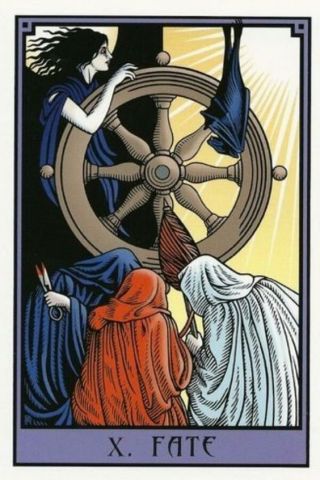Fear
Fate and Destiny: What Role Do They Play in Your Life?
Have you resigned to your fate or are you seeking your destiny?
Posted January 30, 2021 Reviewed by Ekua Hagan

Six months after recovering from a serious illness, I got on a train and headed west to Montana, where I rented a car and drove up into the mountains. Not only had the illness, with its gripping mixture of uncertainty and fear, been a voyage into the unknown but now I was setting forth on a different kind of journey, this time in search of healing.
For a month, I lived on the wilderness property of Brooke Medicine Eagle, a Native American wisdom teacher and author, in a caravan by myself. Every day, Brooke and I went into the mountains or to the river and performed ceremonies for restoring my mind, body, and spirit. I had never done anything like this before. I didn’t know what I really believed about so-called “energy” or “spiritual work.” What I did know, however, was that though my surgery and treatment had been successful, I did not feel completely healed. Intuitively, I sensed something in me still required repair. I understood I needed a different perspective on the meaning of “well-being” or “being well.”

The mythographer and storyteller Michael Meade reminds us that life is our great teacher. We are most aware of this at big turning points in our lives when a crisis arises that can’t be ignored, dismissed, or laughed off, when no simple or previous solution fits the remedy. At such times, old ideas, patterns, relationships, and jobs can feel depleted of relevance, requiring that we let go of the past and start anew. Decisions must be made, and a path forward uncovered.
In his book, Fate and Destiny: The Two Agreements of the Soul, Meade writes:
“What I am calling fate has to do with the way a person’s soul is seeded and shaped from within, like a story trying to unfold and become known. What I am calling destiny has to do with the inner arc and arrow of one’s life. For each soul is secretly aimed at the world and inclined toward a destination that only becomes revealed in crucial moments and at turning points in life. The elements of fate and destiny are intimations of the story our soul would have us live, both the limitations that must be faced and the destination that would be found. As fate would have it, they are often found through what seems like a big mistake, a strange accident or a surprise.”

Fate. Destiny. Soul. These abstract nouns sound outdated, even ludicrous to some. We are much more comfortable with words like adversity and resilience, empowerment and recovery with their scientific, reality-based aura. However, the concepts of fate, destiny, and soul have always been interwoven with humankind’s search for meaning and underlie the roots of most religious traditions. They point to a vastly larger, wilder, and incomprehensible universe whose mysteries we are still unlocking, and which can never be fully known.
Of fate, Meade continues:
“Fate is a mysterious presence found within each life and encountered in all serious undertakings ... Fate appears as whatever limits, restricts or even imprisons us; yet fate is the territory where we must go if we are to awaken to our inner destiny.”
Many traditions contain a similar understanding of a guiding force that is both a part of us and also connected to a larger cosmology. Call it our Buddha nature, our daimon or genius, the Self, or the Soul, something beyond our ego that exists as a governing principle that shapes the story we live out. It manifests in the twists and turns, struggles, possibilities, and opportunities for growth.
We often talk about being “resigned to our fate” but “seeking our destiny.” Here is how Meade distinguishes the two:
“Fate may involve the earthly limitations of our ‘lot in life,’ but destiny, from the Latin, destinare, implies that we are also ‘of the stars.’ ... Destiny can mean ‘to stand out, to stand apart,’ especially to be seen standing in a visible relation to one’s inner genius. Destiny involves an irreversible process of becoming from within.”

We are called to acknowledge the interplay of fate and destiny during life’s most perplexing moments when something beyond the rational seems to have laid its hand on us, often when life and death hang in the balance. Why did my house escape the tornado when all the houses on the block were destroyed? Why did I get stuck in traffic and miss the fire at my office? Why did I get the position when I’m not as credentialed as the other applicants? When we look deeply into these questions, we uncover how the fateful event serves a deeper purpose threaded throughout our days. While we enter life with both limitations and unique talents, our destiny plays out in how we creatively incorporate these into the unfolding narrative of our lives.
To return to my own story, illness knocked me out of complacency, swept me out to sea, and deposited me on the shores of a new continent. It altered my sense of safety and security. An enormously important event disrupted my world. The way I perceived life had been forever changed. This was my fate. My destiny involved honoring an inner voice that prompted me to go in search of healing, but I would have no map. This is exactly what fairytales teach: To find the golden egg, to escape the ravenous monster, to reunite with our lost soul we must be extraordinarily brave, abide with uncertainty, trust the helpers along the way, (instincts and intuitions are often represented in tales as helpful animals or humble elders), and most fervently bring our faith and all our heart to the task.
Honoring the promptings of my intuition, I contacted Brooke and set out on destiny’s adventure.

We have been living through a hard season of plague and disruption. Many of our assumptions about ourselves as a society and as a country have been shattered. The time is ripe for considering how the thread of our individual fate is interwoven with the destiny of the country and the planet. Here are some prompts for beginning that exploration:
- Make a list of the major turning points in your life. (You can illustrate these questions with a brainstorming mind map to help you see the connections between turning points.)
- What do you think was being asked of you at each of these fateful moments?
- Were you required to make a decision?
- What was the result of your decision?
- What do you understand now about the situation that you did not understand previously?
- What pattern and toward what inner goal do you believe these events were leading you?
- What do you feel is still unresolved and perhaps waiting to unfold in your life story?
Bringing your full attention to these questions will prompt your psyche for a creative response. Watch and note your dreams as your answers take shape.




